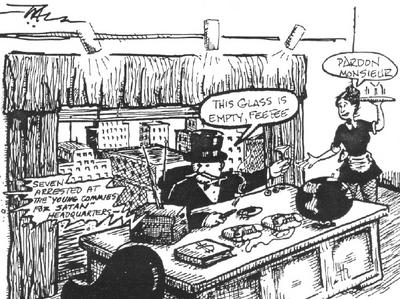 By keeping ordinary things like handbills, cohabitation, gambling, and other "victimless" crimes illegal, it means just about anybody can be harassed by the long arm of the law. But it's the ones with the unfashionable attitudes that feel the boot first.
By keeping ordinary things like handbills, cohabitation, gambling, and other "victimless" crimes illegal, it means just about anybody can be harassed by the long arm of the law. But it's the ones with the unfashionable attitudes that feel the boot first.This pen and ink cartoon of mine above was created in 1983 and first published as a handbill posted on utility poles in the commercial sections of the Fan District. Later it ran in SLANT in 1986. The 'toon was part of a five-year campaign, led by yours truly, to fight off the city's anti-handbill laws. Laws that politicians and yard sale promoters routinely ignored, but bands and clubs were getting busted.
In 1986 an ad hoc group of Fan District artists and musicians formed to pepper The City with a propaganda campaign. In 1987 the local statutes governing handbill-posting in the public way were changed. Essentially, we won. Freedom of speech prevailed.

3 comments:
Isn't it amazing -- that in a few short decades -- the special freedoms and liberties and guarantees that were so hard fought for, by our own forebears, these would be so taken for granted -- and underappreciated and unguarded, such that within a mere generation they could be eroded away. And it's in times of fear - like those of today -- when some might trade away their freedoms for some false sense of security.
Thank you remembering and honoring the tradition of our Virginian heroes, those like Patrick Henry, who had courage when others around him were afraid or unwilling to speak.
Terry, I linked to narrative about the trial. I'm not from Richmond but college towns, like Albany, in New York, had the same types of battles.
I started as a teenager working for what used to be called an underground paper.
I fought the same good fight. It's still fun to listen to others' old war stories.
And the fight for freedom of expression always goes on.
Bill, AIAW,
It seems each generation has to fight its own free speech battles. I’ve been to court three times as a defendant, in First Amendment cases -- two criminal, one civil. Won them all.
Now I worry that tradition is much less important to the 20-and 30-somethings today. Thanks for commenting.
Post a Comment